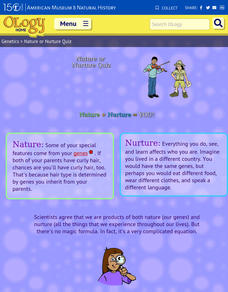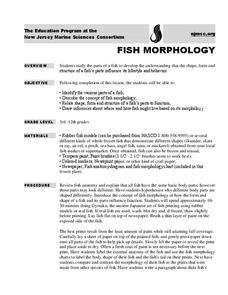Curated OER
Behavioral Biology
This document was produced as a reading guide for a specific textbook chapter on behavioral biology. Suitable for an AP or college-level biology course, it contains sixteen short-answer questions pertaining to animal behavior. Consider...
Flipped Math
End Behavior
Determine which way to go. Pupils learn how the leading term determines the end behavior of a polynomial function. They see how to use the end behavior of a polynomial to identify the graph of the function before practicing their skills...
Curated OER
Learned Behaviors
In this learned behaviors worksheet, students will learn the steps that Pavlov took in conditioning dogs to drool when they heard a bell. Students will then complete 2 short answer questions based on Pavlov's experiment.
Curated OER
Learned Behavior
In this learned behavior learning exercise, students review different types of learned behavior including habituation and trial-and-error learning. This learning exercise has 7 short answer, 8 matching, and 10 fill in the blank questions.
Virginia Department of Education
Functions: Domain, Range, End Behavior, Increasing or Decreasing
Examine key features of various functions through exploration. A comprehensive lesson has learners describe the domain, range, end behavior and increasing/decreasing intervals of various functions. Function types include linear,...
Curated OER
Types of Behavior: Animal Behavior Research
How does one determine what influences animal behavior; Is it nature or nurture? After a short reading explaining different types of conditioning and other learned behaviors, scholars examine six scenarios to determine whether the...
Talking with Trees
What is Respect?
Inspire scholars to be the best they can be with a worksheet featuring the character trait, respect. Individuals read multiple scenarios, match their outcomes, and identify whether the behavior was respectful or disrespectful.
Curated OER
Animal Behavior
In this animal behavior worksheet, students will read a paragraph comparing learned behaviors and inherited behaviors. Students will then complete 2 short answer questions.
Curated OER
Types of Behavior
In this behavior worksheet, high schoolers review the different types of behaviors including instinct, reflex, and learned behaviors. This worksheet has 10 terms in a crossword puzzle and 6 fill in the blank questions.
Therapist Aid
Anger Diary
This worksheet provides a log for users to record incidents of anger. Meant to be used as an ongoing diary, the users log times they were angry, their feelings and behaviors surrounding the incident, as well as the results of their...
Talking with Trees
What is Responsibility?
Encourage responsible behavior with a worksheet that challenges scholars to read four scenarios, identify the level of responsibility, and brainstorm consequences of the actions taken.
Curated OER
Temperature and the Density of Air
Here is a hands-on activity in which junior scientists put air into a balloon to create a closed system. They measure its circumference, warm it in hot water, and then remeasure its circumference to discover how temperature affects the...
Curated OER
What to Expect on Valentines Day: A Social Story
Valentine's Day is fun and exciting for most members of your class, but for learners on the autism spectrum, it can be disorienting. A social story demonstrates what one can expect on Valentine's Day. It explains what happens on...
Federal Reserve Bank
Time Inconsistency: Today’s Actions = Tomorrow’s Regrets
Why do we choose instant gratification over maximizing lifetime satisfaction? How is this reflected in government and macroeconomics? Learn how one research analyst proposes individuals and governments can accomplish greater lifetime...
Curated OER
Types of Behavior
In this science instructional activity, students analyze specific animal and human behaviors and classify them as innate or learned. Students answer 20 questions, identifying behaviors and explaining how they are helpful to the animal....
It's About Time
The Chemical Behavior of Atoms
Assist your class with this colorful activity as students view and interpret changes in the hydrogen atom. They discuss concepts of the electromagnetic spectrum and use Bohr's model to predict wavelengths and light patterns,...
Curated OER
Student Opinion: Are You Popular, Quirky or Conformist?
Approach the topic of popularity with this resource from the New York Times and their Learning Network series. The article is about Alexandra Robbins' "Quirk Theory." Learners respond to the article excerpt either on paper or online....
Virginia Department of Education
Rational Functions: Intercepts, Asymptotes, and Discontinuity
Discover different patterns by making connections between a rational function and its graph. An engaging instructional activity asks scholars to explore the behavior of different rational functions. Groups discover a connection between...
American Museum of Natural History
Nature or Nurture Quiz
Eighteen questions ask pupils whether certain behavior or trait is based on nature or nurture. Scholars take a quiz, reflect on their answers, then challenge a friend or family member to complete it.
Curated OER
Student Opinion: How Impulsive Are You?
Sure to spark lively discussion in any Language Arts classroom, this article from The York Times asks the question, 'How much self-control do you have?'. Pupils begin by reading a short passage about a study on delayed gratification and...
It's About Time
How Atoms Interact with Each Other
Connect the dots and assist young chemists as they demonstrate covalent and ionic bonding. Class members use their knowledge of valence electrons to predict compound formulas as they arrange electrons into various bonding structures to...
Health Smart Virginia
Effective Communication Skills
As part of a review of concepts taught in the Health Smart unit, individuals fill out a chart contrasting passive, assertive, and aggressive behaviors. They then practice their assertiveness skills by craft "I" messages and responses to...
It's About Time
Circular Motion
Lead your class in this exciting activity to learn more about motion and its importance. Pupils learn about a centripetal and why it is required to maintain a constant speed in a circulating moving mass. They apply the equation for...
Consortium for Ocean Science Exploration and Engagement (COSEE)
Fish Morphology
Life comes in all different shapes and sizes, and fish are no exception. Here, young scientists create fish prints as they learn how specific characteristics allow different species to survive in their particular habitats.
Other popular searches
- Innate and Learned Behaviors
- Animals Learned Behaviors
- Animal Learned Behaviors
- Cats Learned Behaviors
- Learned Behaviors of Animals
- Learned Behaviors Worksheet
- Instinct and Learned Behaviors

























